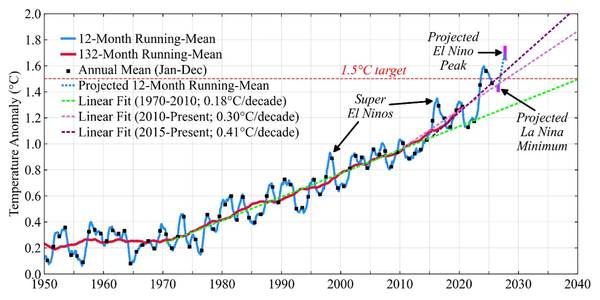James Hansen: Candid Truth About Global Warming
"Substantial underestimate"

In a recent presentation for ATLAS25, Dr. James E. Hansen, the climate scientist who first brought global warming to world attention with his 1988 testimony to the US Congress, shared his latest, urgent findings on the state of the climate.
Dr. Hansen, the former director of NASA's Goddard Institute for Space Studies, warns that humanity has a larger price to pay than currently expected and criticizes institutional failures to communicate the true scale of the crisis.
Here is a summary of his key points:
- Global warming is accelerating. The causes include increasing greenhouse gases coupled with a reduction in particulate air pollution, particularly from East Asia and ships at sea.
1.5°C Threshold Passed: Based on satellite data showing the Earth is strongly out of energy balance, he concludes, "We do not need to wait 10 years to conclude that we have reached 1.5 degrees global warming".
Climate Sensitivity is Higher: He contends that the Intergovernmental Panel on Climate Change's (IPCC) best estimate for climate sensitivity is a "substantial underestimate". He suggests that the sensitivity is between 4 and 5°C for doubled CO2, rather than the widely cited 3°C. This higher sensitivity implies humanity faces a far greater challenge than is commonly discussed.
- Hansen was highly critical of the scientific community and media for what he calls "scientific reticence on steroids".
He cited the response to his global warming acceleration paper, which was condemned in the media by some experts who did not discuss the physics in the paper. He lamented the resulting "non-science nonsense" that led the media to drop the discussion.
The 1.5°C Narrative is "Hogwash": He directly challenged the common narrative that warming can be limited to 1.5°C via net-zero emissions by 2050, calling it "hogwash". He argues the real world is closer to the IPCC's high-emissions scenario (RCP 8.5) and that global warming will exceed 2°C.
- Dr. Hansen cautioned against the idea of reversible amplifying feedbacks, stressing the real danger of a "tipping point that can accelerate and pass a point of no return" on any time scale that people care about.
The "prime example" of such an irreversible threat is the shutdown of the North Atlantic deep water formation. He argues that based on current science, "we are on track for shutdown within a few decades".
This North Atlantic shutdown, in turn, will accelerate the melting of Antarctic ice shelves, leading to large sea-level rise.
- To achieve a stable climate, Dr. Hansen stated that humanity must reduce carbon intensity to near zero by mid-century.
He noted that the world missed a crucial chance to develop more capable nuclear power to complement renewables. He questioned the role of advisors who "do not advise," citing the IPCC's silence when Germany insisted that nuclear power be disallowed as a clean development mechanism.
While China, the US, and India produce half of global emissions, he emphasizes that the US is the greatest cause of global warming on a per capita basis, meaning the "responsibility of the west is even greater". Ultimately, he stresses that all nations live on the same planet and must cooperate to face the same future.
You can watch the full presentation here:
My name is Sarah and I run Collapse2050 by myself. It is a place for the collapse-aware community to learn, debate and connect.
Please consider subscribing. The site is free for all, but paid subscribers and one-time contributors help to cover hosting and production costs. Support also goes towards my gradual shift to full time research, collaboration and writing.
Thank you. Sarah



